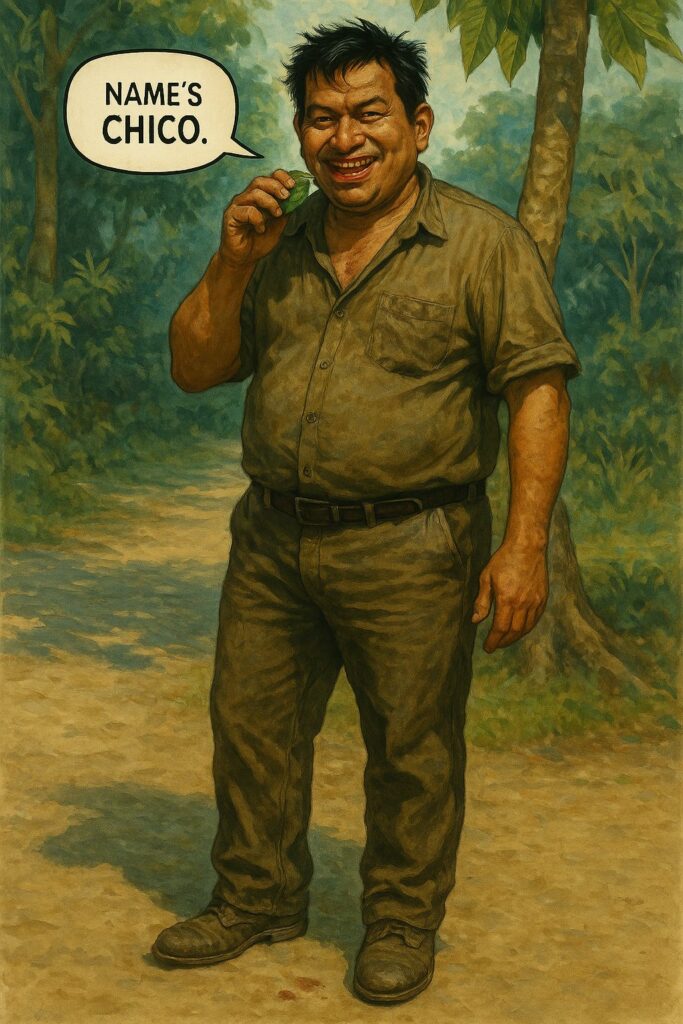Search Results for 'doubt'
-
AuthorSearch Results
-
February 9, 2026 at 10:51 pm #8057
In reply to: The Hoards of Sanctorum AD26
Perspicacious as she undoubtedly was, Mrs Fennel decisively turned on her heel and marched (as well as she could with her arthritic hip) out of the room with the tray of tea and Karstic Rock Cakes, and limped off in the direction of the kitchen. If they want tea and cakes, they can come to the kitchen. Mars F always kept her kitchen streamlined, orderly and uncluttered for maximum efficiency.
The retreating aroma of freshy baked muffins animated Spirius sufficiently for him to hasten after the refreshment laden maid of all work, and take the tray off her.
Mrs Fennel smirked, rubbing her hands on her apron as if to remove the jumbled derangement from her capable hands.
When Yvoise was perusing the transcription of the security and posterity camera recording later, prior to filing it, she noticed Mars F, and wondered. What could it mean?
February 5, 2026 at 11:51 pm #8055In reply to: The Hoards of Sanctorum AD26
Helier watched Yvoise squinting at the bone through her screen, trying to decipher the “map” amidst the noxious fumes. He observed the scene with a detachment that surprised him.
The room was vibrating with tension, but for once, it wasn’t coming from Yvoise —it was directed at her. She was standing by the window, phone pressed to her ear, nodding furiously at some invisible bureaucrat on the other end.
“I am violently in agreement with you, Mr. Prufrock,” she was saying, her voice tight but diplomatic. “The olfactory output of Unit 26 is indeed non-compliant with the Olympus Park Clean Air protocols. We are… rectifying the asset.”
It was the “Kyber-Auditor” from the Business Park Administration. The new management had been cracking down lately, restricting their “unauthorized usage” of miracles and enforcing standard operating procedures.
It was all too much noise. Above the smell, which was screaming of decay rather than play, there was the frantic energy of it all. Mrs. Fennel’s panic, Yvoise’s spreadsheets, the looming threat of this “Varlet” from the Council. It was pure Negotium, the active denial of peace, waging war on the idle time of the Romans: Otium. The world was demanding relentlessly that they justify their existence with hygiene certificates, clean surfaces, and significantly fewer piled-up treasures, branding their sacred collections as mere “trip hazards.”
Helier gripped the bamboo handle of his umbrella —a sturdy, shepherd-style thing he had almost tossed into the ‘Charity Pile’ yesterday. He felt a sudden, fierce longing for Otium, a sacred pause where one simply is.
Earlier that morning, a delivery guy had held the elevator door for him with a foot, balancing a mountain of cardboard boxes. A simple, clumsy gesture of kindness amidst the clutter. It had stayed with Helier. It reminded him that you could be overloaded and still have grace. That moment of suspension, of courteous stillness in the middle of the rush, had been a tiny bubble of Otium.
They needed that bubble now. They needed to stop the clock.
Spirius, who had been hovering in the doorway, seemed to hear Helier’s thought.
“A map is useless if you pass out before you can follow it,” Spirius muttered. He stepped fully into the room, brandishing a heavy glass jar like a weapon. “We need a Containment of the Sins.”
“A what?” asked Cerenise, holding her nose.
“Of WHAT?!” asked Yvoise, raising an eyebrow while covering her mouthpiece.
“Sins…” Spirius said doubtfully, “…that should bring back some memories.”
He marched to the table. “Hold on to your halos…”
Yvoise pulled back, shielding her phone. “Wait! I haven’t finished cataloging the striations—”
“The bone will be visible through the glass, Yvoise. But the miasma must be paused.”
Spirius didn’t wait for a vote. He scooped the yellowed bone—and its mysterious map—into the jar. He didn’t recite a Latin prayer. He didn’t summon a lightning bolt. The Administration wouldn’t allow that kind of energy spike anyway. He just screwed the lid on tight, with one word.
“Oïton,” Spirius incanted.
To Helier’s ears, attuned to the drift of languages over centuries, it didn’t sound like a name anymore. It sounded like a desperate, corrupted invocation of the old Latin. Otium. The right to be left alone, fierce as a dragon guarding its sleep.
Psshitt.
It was the sound of a pressure valve releasing. Soft, pneumatic.
Instantly, the stench was cut off. Deleted. The air was neutral again, smelling only of old paper and the faint, metallic tang of Yvoise’s anxiety.
“It is done,” Spirius announced, holding up the jar. The bone rattled inside, harmless now, an archived file. The faint lines of the map were still visible against the glass, safe in their bubble of silence.
“Mr. Prufrock?” Yvoise said into the phone, her voice smooth as silk. “I think you’ll find the sensors are returning to normal parameters. Yes. Have a productive day.”
She hung up and slumped against the curtains, letting out a breath she seemed to have been holding since New Year’s Eve.
“Well,” Helier said, tapping his umbrella on the floorboards, feeling the tension drain from his shoulders. “That felt… cleansing.”
“If we could do that with the auditor, it would be a marvelous idea,” Cerenise agreed, eyeing the jar with renewed interest. “A spiritual purification. Now, Yvoise, hand me a magnifying glass. If we have restored our Otium, we might as well use it to see where this bone wants to take us.”
“A Novena, even,” Yvoise added, a mischievous glint returning to her eye. “Technically, we have ‘cleansed’ the house of the impurity. The Will didn’t explicitly say we had to throw away the good stuff. Just the… bad air.”
Helier smiled. It was a loophole, of course. A massive, gaping loophole. The threat of the Novena still hung over them like a storm cloud that hadn’t quite burst, and the mystery of the Varlet descendant was still unresolved. But for today, the audit was over. The hoard was safe.
“Oïton,” Helier repeated softly, testing the weight of the word. He looked at his umbrella. He wouldn’t need to open it. The storm had passed.
January 16, 2026 at 10:55 pm #8047In reply to: The Hoards of Sanctorum AD26
That last flu had been a sorry affliction. It must have come through the vents from the depths of the sewers, no doubt—like those permafrost organisms scientists find caught in time.
It had taken down the whole lot of them in sequence after Spirius had come back victorious from his chthonian feats. Or so he said; Boothroyd was suspiciously mum about what they did with the beast’s hide. In any case, the others gave them both the benefit of the doubt. Whatever had happened during that beast chase on the inflatable dinghy had managed to clear the clogged pipes, almost miraculously. It had also gifted them this pesky flu.
Austreberthe’s requests had become an afterthought, even for the most pig-headed of them. It wasn’t a contest, or they would all have won a prize anyway. After two days of cold, fever, and fog-headed manic ideations, Helier’s head had finally cleared.
He was left with a fond familiarity for all the stuff accumulated in his search for knowledge, yet, surprisingly, a sense of disconnection from what had made them so precious all that time. He wasn’t so far gone as to want to clear everything away—Lord forbid—but he was mildly tempted to make space somewhere. He almost shuddered at the thought.
What would he move to make space? A few precious stamps? Surely not.
They had all sorts of value: sentimental, historical, artistic—you name it.
What else? Vinyl records? They would fetch a small fortune now in some circles, but to part with them?…
A book? Most sacred!… A Liz Tattler book?… He paused… nah.There was a half-chewed pencil stub on the table. It could still have a good hundred pages worth of scribbles left in it. His heart started to race at the thought of getting rid of it. A voice in his head whispered, “Give it away! Give it away! You’ll be lighter for it.”
He didn’t want to feel lighter. But he was interested in the racing heart. It was a sign of getting back some action.
He heard the squeaking roll of Cerenise’s chair before he heard her copious sneezing.
July 16, 2025 at 6:06 am #7969In reply to: The Elusive Samuel Housley and Other Family Stories
Gatacre Hall and The Old Book
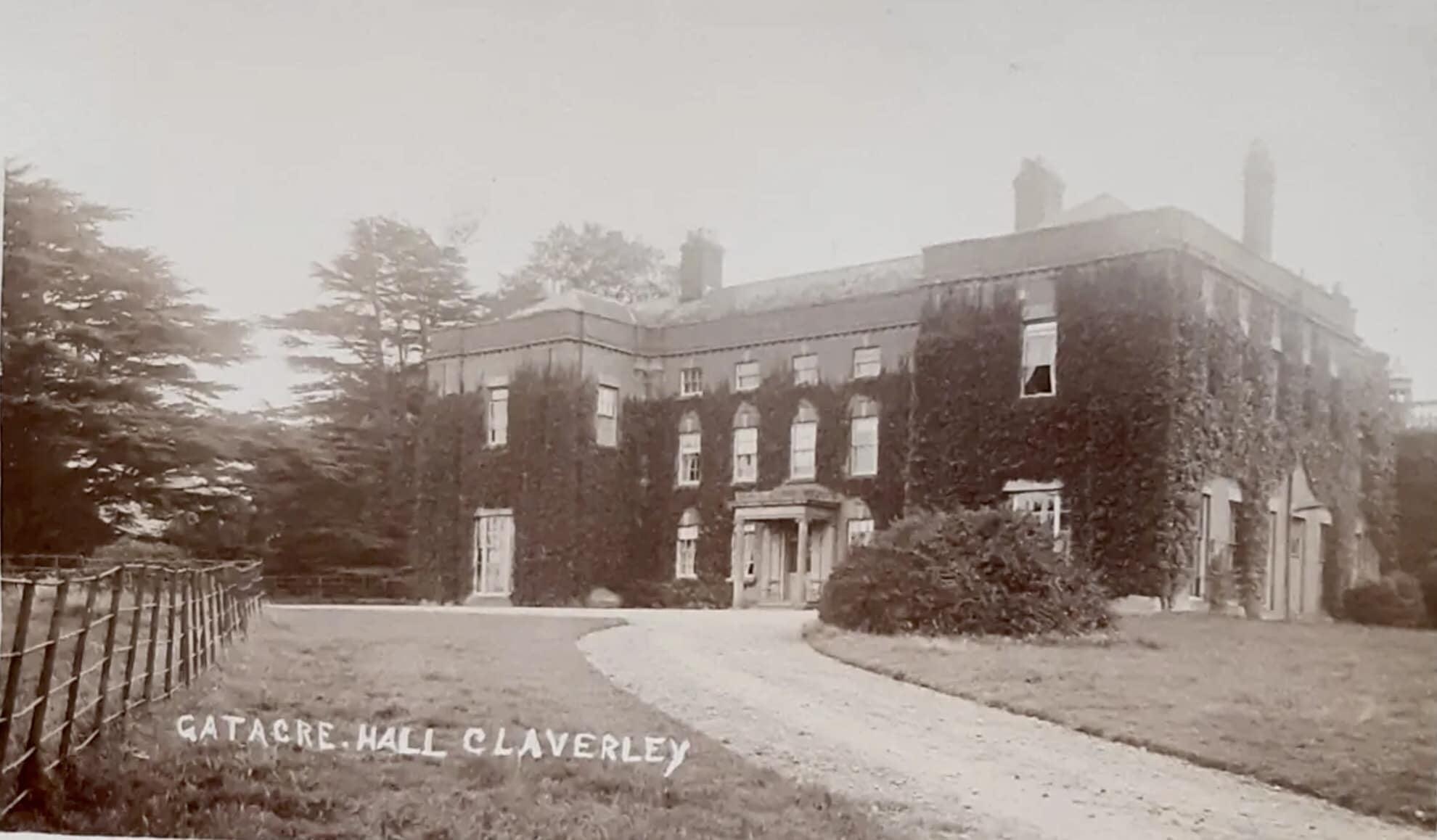
In the early 1950s my uncle John and his friend, possibly John Clare, ventured into an abandoned old house while out walking in Shropshire. He (or his friend) saved an old book from the vandalised dereliction and took it home. Somehow my mother ended up with the book.
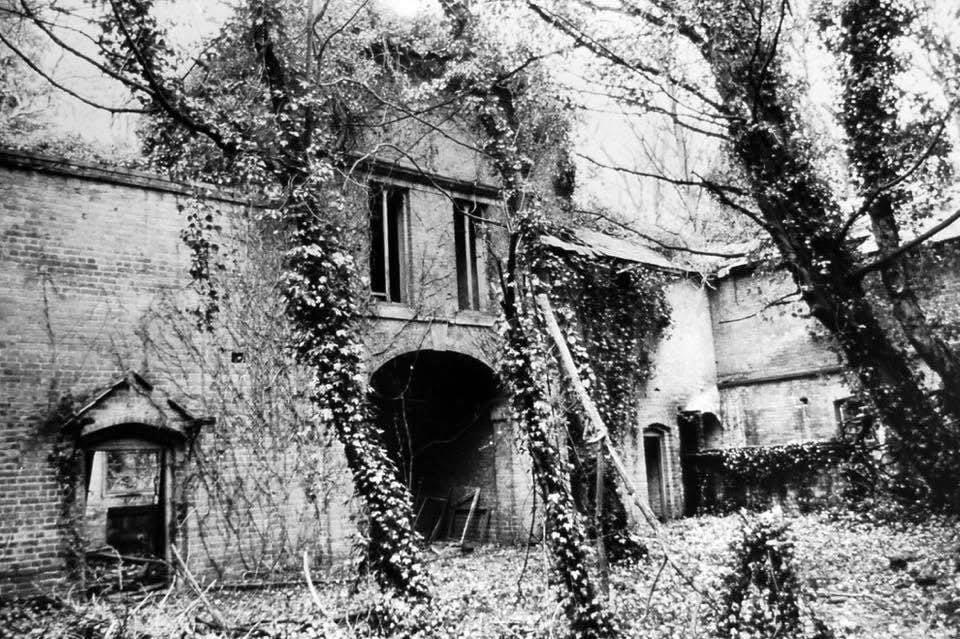
I remember that we had the book when we were living in USA, and that my mother said that John didn’t want the book in his house. He had said the abandoned hall had been spooky. The book was heavy and thick with a hard cover. I recall it was a “magazine” which seemed odd to me at the time; a compendium of information. I seem to recall the date 1553, but also recall that it was during the reign of Henry VIII. No doubt one of those recollections is wrong, probably the date. It was written in English, and had illustrations, presumably woodcuts.
I found out a few years ago that my mother had sold the book some years before. Had I known she was going to sell it, I’d have first asked her not to, and then at least made a note of the name of it, and taken photographs of it. It seems that she sold the book in Connecticut, USA, probably in the 1980’s.
My cousin and I were talking about the book and the story. We decided to try and find out which abandoned house it was although we didn’t have much to go on: it was in Shropshire, it was in a state of abandoned dereliction in the early 50s, and it contained antiquarian books.
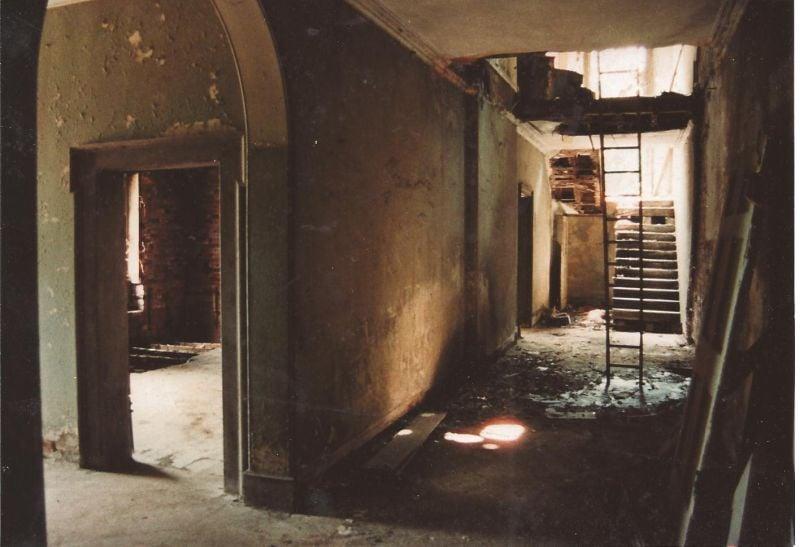
I posted the story on a Shropshire History and Nostalgia facebook group, and almost immediately had a reply from someone whose husband remembered such a place with ancient books and manuscripts all over the floor, and the place was called Gatacre Hall in Claverley, near Bridgnorth. She also said that there was a story that the family had fled to Canada just after WWII, even leaving the dishes on the table.
The Gatacre family sailing to Canada in 1947:
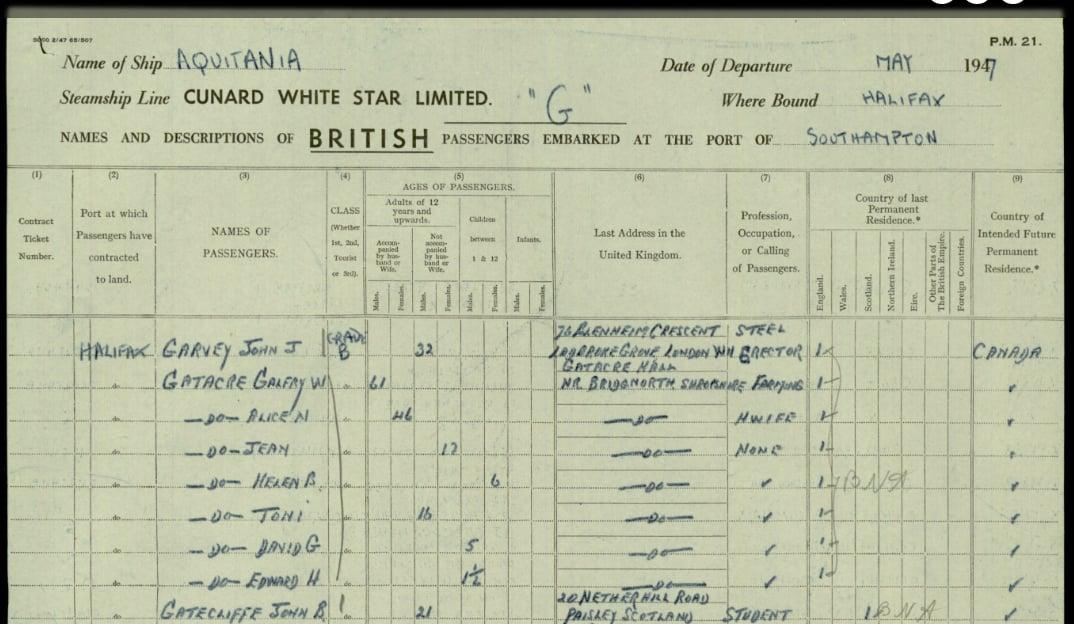
When my cousin heard the name Gatacre Hall she remembered that was the name of the place where her father had found the book.
I looked into Gatacre Hall online, in the newspaper archives, the usual genealogy sites and google books searches and so on. The estate had been going downhill with debts for some years. The old squire died in 1911, and his eldest son died in 1916 at the Somme. Another son, Galfrey Gatacre, was already farming in BC, Canada. He was unable to sell Gatacre Hall because of an entail, so he closed the house up. Between 1945-1947 some important pieces of furniture were auctioned, and the rest appears to have been left in the empty house.
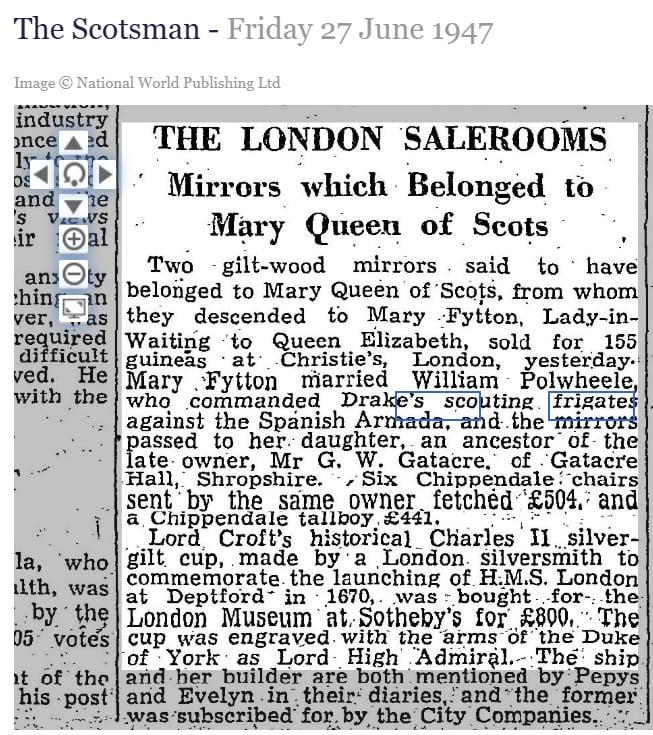
The family didn’t suddenly flee to Canada leaving the dishes on the table, although it was true that the family were living in Canada.
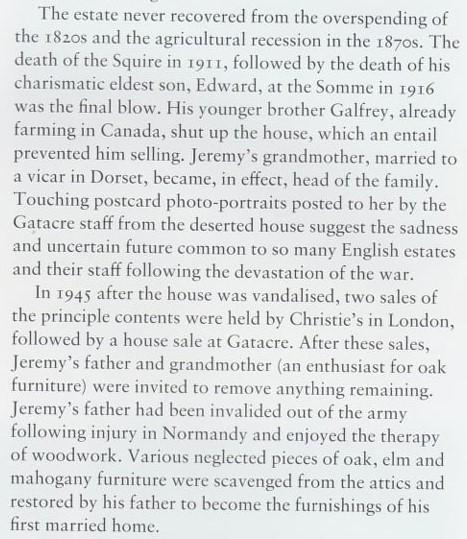
An interesting thing to note here is that not long after this book was found, my parents moved to BC Canada (where I was born), and a year later my uncle moved to Toronto (where he met his wife).
Captain Gatacre in 1918:
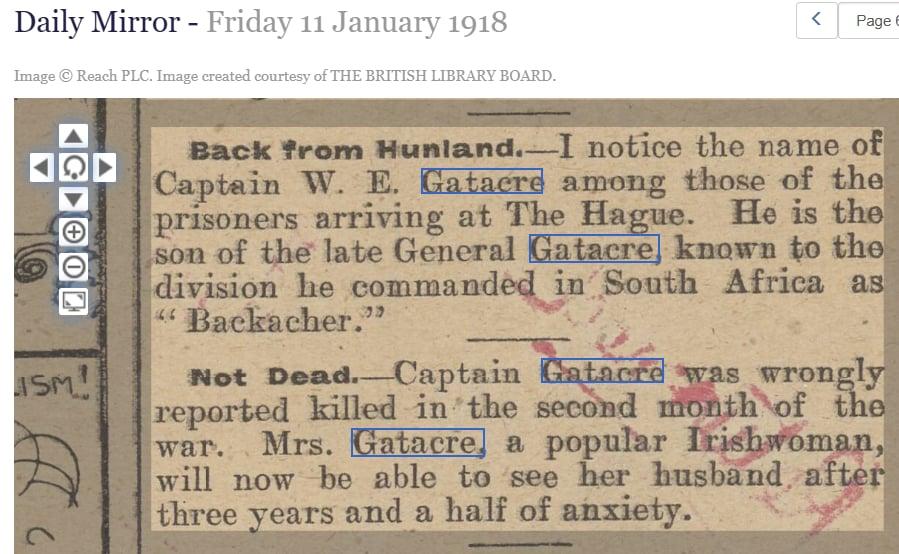
The Gatacre library was mentioned in the auction notes of a particular antiquarian book:
“Provenance: Contemporary ownership inscription and textual annotations of Thomas Gatacre (1533-1593). A younger son of William Gatacre of Gatacre Hall in Shropshire, he studied at the English college at the University of Leuven, where he rejected his Catholic roots and embraced evangelical Protestantism. He studied for eleven years at Oxford, and four years at Magdalene, Cambridge. In 1568 he was ordained deacon and priest by Bishop of London Edmund Grindal, and became domestic chaplain to Robert Dudley, 1st Earl of Leicester and was later collated to the rectory of St Edmund’s, Lombard Street. His scholarly annotations here reference other classical authors including Plato and Plutarch. His extensive library was mentioned in his will.”
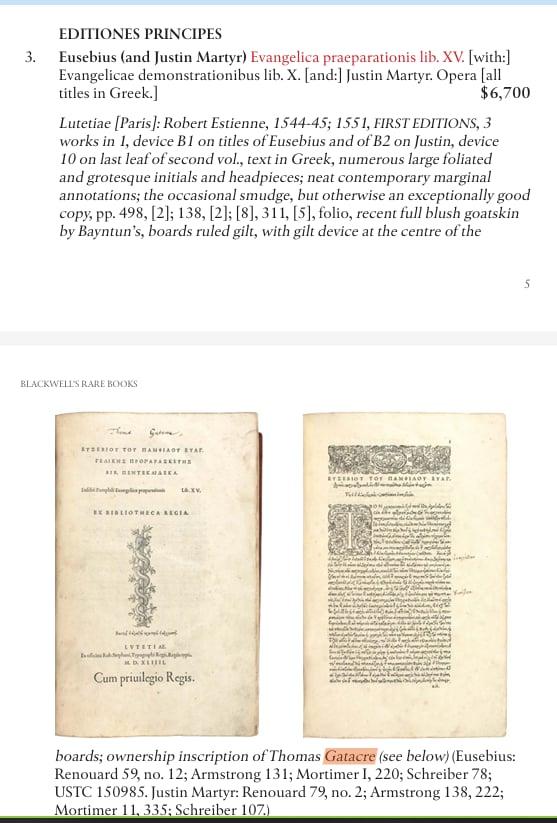
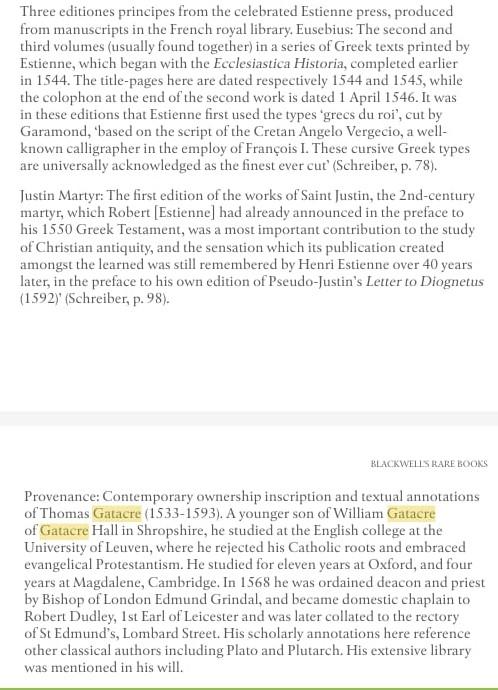
There are thirty four pages in this 1662 book about Thomas Gatacre d 1654:
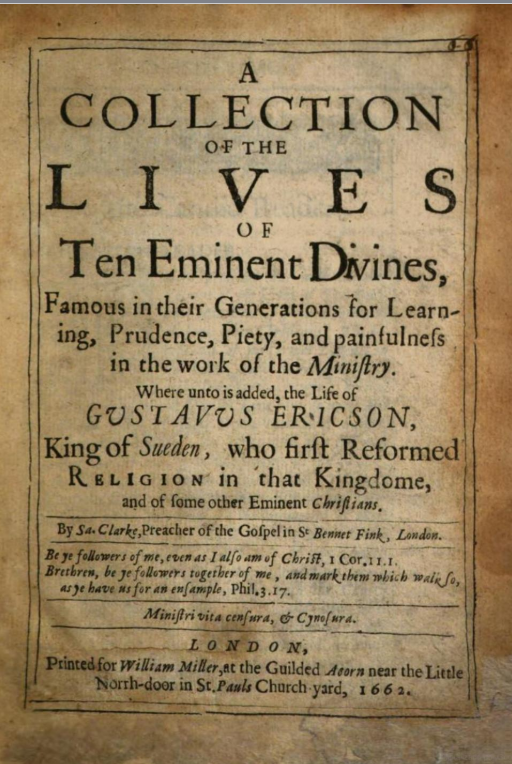
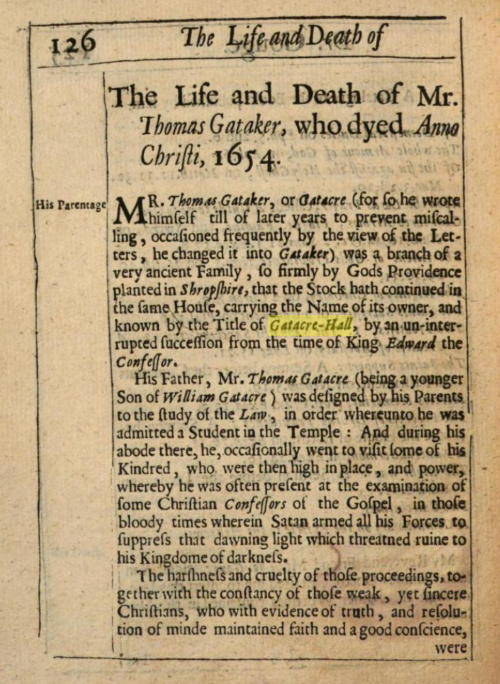 June 7, 2025 at 7:32 am #7955
June 7, 2025 at 7:32 am #7955In reply to: Cofficionados Bandits (vs Lucid Dreamers)
The wind picked up just as Thiram adjusted the gazebo’s solar kettle. At first, he blamed the rising draft on Carob’s sighing—but quickly figured out that this one had… velocity.
Then the scent came floating by: jasmine, hair spray, and over-steeped calamansi tea.
A gust of hot air blew through the plantation clearing, swirling snack wrappers and curling Amy’s page corners. From the vortex stepped a woman, sequins ablaze, eyeliner undefeated.
She wore a velvet shawl patterned like a satellite weather map.
“Did someone say Auringa?” she cooed, gliding forward as her three crystal balls rotated lazily around her hips like obedient moons.
“Madam Auringa?” Kit asked, wide-eyed.Thiram’s devices were starting to bip, checking for facts. “Madam Auringa claims to have been born during a literal typhoon in the Visayas, with a twin sister who “vanished into the eye.” She’s been forecasting mischief, breakups, and supernatural infestations ever since…”
Carob raised an eyebrow. “Source?”
Humphrey harrumphed: “We don’t usually invite atmospheric phenomena!”
“Doctor Madam Auringa, Psychic Climatologist and Typhoon Romantic,” the woman corrected, removing a laminated badge from her ample bosom. “Bachelor of Arts in Forecasted Love and Atmospheric Vibes. I am both the typhoon… and its early warning system.”
“Is she… floating?” Amy whispered.
“No,” said Chico solemnly, “She’s just wearing platform sandals on a bed of mulch.”
Auringa snapped her fingers. A steamy demitasse of kopi luwak materialized midair and plopped neatly into her hand. It wasn’t for drink, although the expensive brevage born of civet feces had an irrepressible appeal —it was for her only to be peered into.
“This coffee is trembling,” she murmured. “It fears a betrayal. A rendezvous gone sideways. A gazebo… compromised.”
Carob reached for her notes. “I knew the gazebo had a hidden floor hatch.”
Madam Auringa raised one bejeweled finger. “But I have come with warning and invitation. The skies have spoken: the Typhoon Auring approaches. And it brings… revelations. Some shall find passion. Others—ant infestations.”
“Did she just say passion or fashion?” Thiram mumbled.
“Both,” Madam Auringa confirmed, winking at him with terrifying precision.
She added ominously “May asim pa ako!”. Thiram’s looked at his translator with doubt : “You… still have a sour taste?”
She tittered, “don’t be silly”. “It means ‘I’ve still got zest’…” her sultry glance disturbing even the ants.
May 17, 2025 at 9:30 pm #7937In reply to: Cofficionados Bandits (vs Lucid Dreamers)
Ricardo splattered the coffee all over Amy, turning a shade of purple in the process.
“What did you put in it? It tastes absolutely revolting!”
Carob tittered. “Just as well. I had my doubts about this new Toktok craze about putting dried shallots and spring onions in lattes. Guess my hunch was on the money.”
Amy wanted to feel incensed, but her brain had stopped at the description of the offending latte “You put what in his latte?! And that coffee’s going to stain my shirt now, I’ll look like a spotted leopard!”
“Funny,” Carob looked down at Amy “that you should pronounce that loo-pard… You sound like a hooligan.”
“Well, better that than an ooligarch.”
“You did it again!”
“Ooh, shut up Caroob.”
May 10, 2025 at 9:02 am #7925In reply to: Cofficionados – What’s Brewing
Chico Ray
Chico Ray
Directly Stated Visual and Behavioral Details:
-
Introduces himself casually: “Name’s Chico,” with no clear past, suggesting a self-aware or recently-written character.
-
Chews betel leaves, staining his teeth red, which gives him a slightly unsettling or feral appearance.
-
Spits on the floor, even in a freshly cleaned café—suggesting poor manners, or possibly defiance.
-
Appears from behind a trumpet tree, implying he lurks or emerges unpredictably.
-
Fabricates plausible-sounding geo-political nonsense (e.g., the coffee restrictions in Rwanda), then second-guesses whether it was fiction or memory.
Inferred Traits:
-
A sharp smile made more vivid by betel staining.
-
Likely wears earth-toned clothes, possibly tropical—evoking Southeast Asian or Central American flavors.
-
Comes off as a blend of rogue mystic and unreliable narrator, leaning toward surreal trickster.
-
Psychological ambiguity—he doubts his own origins, possibly a hallucination, dream being, or quantum hitchhiker.
What Remains Unclear:
-
Precise age or background.
-
His affiliations or loyalties—he doesn’t seem clearly aligned with the Bandits or Lucid Dreamers, but hovers provocatively at the edges.
March 9, 2025 at 11:43 pm #7865In reply to: The Precious Life and Rambles of Liz Tattler
“Well, you made me doubt for a minute if I could live uncomputerised for a moment, Elizabeth. Glad to say I can still live without, and well for it.”
Liz’ was too busy peering into Ethan’s builder’s bum to care to answer.
Godfrey winked at Finley conspiratorially, amused at her horrified look when he mimed throwing a peanut at the electrician’s cleavage.
“So un-sani-tary” she mouthed before quickly returning to the places she goes when nobody looks.
March 9, 2025 at 10:34 pm #7862In reply to: The Last Cruise of Helix 25
Sue Forgelot couldn’t believe her eyes when she came to her ringing door.
Of course, after the Carnival party was over and she’d taken an air shower, and put on her bathrobe with her meerkat slipper, slathered relaxing face cream topped with two slices of cucumber, she was quite groggy, and the cucumber slices on her eyelids made it harder to see. But once she’d removed them, she could see as bright as day.
The Captain was standing right here, and she hadn’t aged a day.
“Quickly, come in.” Sue wasted no time to usher her in. She looked at the corridor suspiciously; at that time of night, only a dusting robot was patrolling the corridors, chasing for dust motes and finger smears on the datapads.
Nobody.
“I haven’t been followed, Sue, will you just relax for a moment.”
“V’ass, it’s been so long. How did you get out?… What broke the code?”
“I don’t know, Sue. I think —something called back, from Earth.”
“From Earth? I didn’t know there was much technology left, or at least one that could reach us there. And one that could bypass that darned central AI —I knew it couldn’t keep you under lock and key forever.”
“Seems there is such tech, and it’s also managed to force the ship to turn around.”
Silence fell on the two friends for a moment, as they were grasping for the implications of the changes in motion.
Veranassessee couldn’t help by smile uncontrollably. “Those rejuvenation tricks do wonders, don’t they. You don’t look a day over a 100 years old.”Sue couldn’t help but chuckle. “And you don’t look so bad yourself, for an old forgotten popsicle.” She tilted her head. “You do know you’ve been in the freezer longer than some of our newest passengers have been alive, right?”
V’ass shrugged. “And yet, here I am—fit, rested, and none the worse for wear.”
Sue sighed. “Meanwhile, I’ve had three hip replacements, a cybernetic knee, and somebody keeps hijacking my artificial leg with spam messages.”
V’ass blinked. “…You should probably get that checked.”
Sue waved her off. “Bah. If it’s not trying to sell me ‘hot singles in my quadrant,’ I let it be.”After the laughter had dissipated, Sue said “You need my help to get back your ship, don’t you?”. She tapped on her cybernetic leg with a knowing smile. “You can count on me.”
Veranassessee noded. “Then start by filling me in, what should I know?”
Sue leaned in conspiratorially. “Ethan is dead, for one.”
“Death?” Veranassessee was weighing the implications, and completed “… Murder?”
Sue shrugged “As much as it pains me to say, it’s all a bit irrelevant. The AI let it happen, but I doubt she pushed the button. Ethan wasn’t much of a threat to its rule. Makes one wonder why, maybe it computed some cascade of events we don’t yet see. They found ancient DNA on the crime scene, but it’s all a mess of clues, and I must say we’re pretty inept at the whole murder mystery thing. Glad we don’t have a serial killer in our midst, or we would have plenty of composting to do…”
Veranassessee started to pace the room. “Well, if there isn’t anything more relevant, we need to hatch a plan. I suspect all my access got revoked; I’ll need a skeleton key to get in the right places. To regain control over the central AI, and the main deck.”
“Of course, the Marlowes…” Sue had a moment of revelation on her face. “They were the crypto locksmiths… With Ethan now dead, maybe we should pay dear old Ellis a visit.”
February 23, 2025 at 1:35 pm #7828In reply to: The Last Cruise of Helix 25
Helix 25 – The Murder Board
Evie sat cross-legged on the floor of her cramped workspace, staring at the scattered notes, datapads, and threads taped to the wall. Finding some yarn on the ship had not been as easy as she thought, but it was a nice touch she thought.
The Murder Board, as Riven Holt had started calling it, was becoming an increasingly frustrating mess of unanswered questions.
Riven stood nearby, arms crossed, with a an irritated skepticism. “Almost a week,” he muttered. “We’re no closer than when we started.”
Evie exhaled sharply. “Then let’s go back to the basics.”
She tapped the board, where the crime scene was crudely sketched. The Drying Machine. Granary. Jardenery. Blood that shouldn’t exist.
She turned to Riven. “Alright, let’s list it out. Who are our suspects?”
He looked at his notes, dejected for a moment; “too many, obviously.” Last census on the ship was not accurate by far, but by all AI’s accounts cross-referenced with Finkley’s bots data, they estimated the population to be between 15,000 and 50,000. Give or take.
They couldn’t interview possibly all of them, all the more since there the interest in the murder had waned very rapidly. Apart from the occasional trio of nosy elderly ladies, the ship had returned mostly to the lull of the day-to-day routine.
So they’d focused on a few, and hoped TP’s machine brain could see patterns where they couldn’t.- First, the Obvious Candidates: People with Proximity to the Crime Scene
Romualdo, the Gardener – Friendly, unassuming. He lends books, grows plants, and talks about Elizabeth Tattler novels. But Herbert visited him often. Why?
Dr. Amara Voss – The geneticist. Her research proves the Crusader DNA link, but could she be hiding more? Despite being Evie’s godmother, she couldn’t be ruled out just yet.
Sue Forgelot – The socialite with connections everywhere. She had eluded their request for interviews. —does she know more than she lets on?
The Cleaning Staff – they had access everywhere. And the murder had a clean elegance to it… - Second, The Wild Cards: People with Unknown Agendas
The Lower Deck Engineers – Talented mechanic, with probable cybernetic knowledge, with probable access to unauthorized modifications. Could they kill for a reason, or for hire?
Zoya Kade and her Followers – They believe Helix 25 is on a doomed course, manipulated by a long-dead tycoon’s plan. Would they kill to force exposure of an inconvenient truth?
The Crew – Behind the sense of duty and polite smiles, could any of them be covering something up? - Third, The AI Factor: Sentient or Insentient?
Synthia, the AI – Controls the ship. Omnipresent. Can see everything, and yet… didn’t notice or report the murder. Too convenient.
Other personal AIs – Like Trevor Pee’s programme, most had in-built mechanisms to make them incapable of lying or harming humans. But could one of their access be compromised?
Riven frowned. “And what about Herbert himself? Who was he, really? He called himself Mr. Herbert, but the cat erm… Mandrake says that wasn’t his real name. If we figure out his past, maybe we find out why he was killed.”
Evie rubbed her temples. “We also still don’t know how he was killed. The ship’s safety systems should have shut the machine down. But something altered how the system perceived him before he went in.”
She gestured to another note. “And there’s still the genetic link. What was Herbert doing with Crusader DNA?”
A heavy silence settled between them.
Then TP’s voice chimed in. “Might I suggest an old detective’s trick? When stumped, return to who benefits.”
Riven exhaled. “Fine. Who benefits from Herbert’s death?”
Evie chewed the end of her stylus. “Depends. If it was personal, the killer is on this ship, and it’s someone who knew him. If it was bigger than Herbert, then we’re dealing with something… deeper.”
TP hummed. “I do hate deeper mysteries. They tend to involve conspiracies, misplaced prophecies, and far too many secret societies.”
Evie and Riven exchanged a glance.
Riven sighed. “We need a break.”
Evie scoffed. “Time means nothing here.”
Riven gestured out the window. “Then let’s go see it. The Sun.”
Helix 25 – The Sun-Gazing Chamber
The Sun-Gazing Chamber was one of Helix 25’s more poetic and yet practical inventions —an optically and digitally-enhanced projection of the Sun, positioned at the ship’s perihelion. It was meant to provide a psychological tether, a sense of humanity’s connection to the prime provider of life as they drifted in the void of the Solar System.
It was a beautifully designed setting where people would simply sit and relax, attuned to the shift of days and nights as if still on Earth. The primary setting had been voted to a massive 83.5% to be like in Hawai’i latitude and longitude, as its place was believed to be a reflection of Earth’s heart. That is was a State in the USA was a second thought of course.Evie sat on the observation bench, staring at the massive, golden sphere suspended in the darkness. “Do you think people back on Earth are still watching the sunrise?” she murmured.
Riven was quiet for a moment. “If there’s anyone left.”
Evie frowned. “If they are, I doubt they got much of a choice.”
TP materialized beside them, adjusting his holographic tie. “Ah, the age-old existential debate: are we the lucky ones who left Earth, or the tragic fools who abandoned it?”
Evie ignored him, glancing at the other ship residents in the chamber. Most people just sat quietly, basking in the light. But she caught snippets of whispers, doubt, something spreading through the ranks.
“Some people think we’re not really where they say we are,” she muttered.
Riven raised an eyebrow. “What, like conspiracy theories?”
TP scoffed. “Oh, you mean the Flat-Earthers?” He tsked. “Who couldn’t jump on the Helix lifeboats for their lives, convinced as they were we couldn’t make it to the stars. They deserved what came to them. Next they’ll be saying Helix 25 never even launched and we’re all just trapped in a simulation of a luxury cruise.”
Evie was shocked at Trevor Pee’s eructation and rubbed her face. “Damn Effin Muck tech, and those “Truth Control” rubbish datasets. I thought I’d thoroughly scrubbed all the old propaganda tech from the system.”
“Ah,” TP said, “but conspiracies are like mold. Persistent. Annoying. Occasionally toxic.”
Riven shook his head. “It’s nonsense. We’re moving. We’ve been moving for decades.”
Evie didn’t look convinced. “Then why do we feel stuck?”
A chime interrupted them.
A voice, over the comms. Solar flare alert.
Evie stiffened.
Then: Stay calm and return to your quarters until further notice.
Evie raised an eyebrow. This was the first time something like that happened. She turned to Riven who was looking at his datapad who was flashing and buzzing.
He said to her: “Stay quiet and come with me, a new death has been reported. Crazy coincidence. It’s just behind the Sun-Gazing chamber actually, in the Zero-G sector.”
February 7, 2025 at 9:16 am #7736In reply to: The Last Cruise of Helix 25
“Premeditated?” Evie voiced her thoughts.
TP looked at her sharply. “That would be the obvious conclusion to draw, my dear Evie. However,” he continued after a pregnant pause, “The conclusion may not be obvious at all.”
Evie rolled her eyes. “When in doubt, assume convolutions?”
A look of irritation clouded TP’s features momentarily, which he quickly arranged to a look of supercilious exasperation. “You assume,” he said condescendingly, “That Herbert WAS a human when he entered the drying chamber.”
Evie was confused. “Well he was a dessicated human when he was found in there. And he was a human when I last saw him.”
“And what do we know about Mr Herbert? Mr Ethan “Herbert”?”
Nonplussed, Evie replied that she didn’t know much about him, other than he was a late arrival and had appeared unexpectedly some years ago.
“Precisely.”
December 1, 2024 at 10:36 pm #7630In reply to: Quintessence: Reversing the Fifth
Lucien pulled his suitcase through the rain-slick streets of Paris, the wheels rattling unevenly over the cobblestones. The rain fell in silver threads, blurring the city into streaks of light and shadow. His scarf, already streaked with paint, hung heavy and damp around his neck. Each step toward the café felt weighted, though he couldn’t tell if it was the suitcase behind him or the memories ahead.
The note he sent his friends had been simple. Sarah Bernhardt Café, November 30th , 4 PM. No excuses this time! Writing it had felt strange, as though summoning ghosts he wasn’t sure were ready to return. And now, with the café just blocks away, Lucien wasn’t sure if he wanted them to. Five years had passed since the four of them had last been together. He had told himself he needed this meeting—closure, perhaps—but a part of him still doubted.
He paused beneath a bookstore awning, the rain tracing fractured lines down the glass. His suitcase leaned against his leg, its weight pressing into him. Inside: a crumpled heap of clothes that smelled faintly of turpentine and the damp studio he had left behind, sketchbooks filled with forgotten drawings, and a small bundle wrapped in linen. Something he wasn’t ready to let go of—or couldn’t. He hadn’t decided yet if he was coming back or going away.
Lucien reached into his pocket and pulled out his last sketchbook. Flipping absently through its pages, he stopped at an old drawing of Darius, leaning over the edge of a rickety bridge, hand outstretched toward something unseen. He could still hear Darius’s voice: If you’re afraid of falling, you’ll never know what’s waiting. Lucien had scoffed then, but now the words lingered, uncomfortable in their truth.
The café came into view, its warm light pooling onto the wet street. Through the rain-speckled windows, he saw the familiar brass fixtures and etched glass, unchanged by time. He stepped inside, the warmth closing around him, and made his way to the corner table. Their table.
Setting the suitcase down, he folded into the chair and opened his sketchbook to a blank page. His pencil hovered. Outside, the rain fell softly, its rhythm steady against the glass. Inside, Lucien’s chest felt heavy. To make it go away, he started to scratch faint lines across the page.
August 16, 2024 at 2:56 pm #7544In reply to: The Elusive Samuel Housley and Other Family Stories
Youlgreave
The Frost Family and The Big Snow
The Youlgreave parish registers are said to be the most complete and interesting in the country. Starting in 1558, they are still largely intact today.
“The future historian of this parish will find a vast stock of material ready to hand, and if such a work was ever accomplished it would once more be seen how the history of even a remote village is but the history of the nation in little; how national victories were announced on the church bells, and national disasters by the proclamation of a form of prayer…”
J. Charles Cox, Notes on the Churches of Derbyshire, 1877.
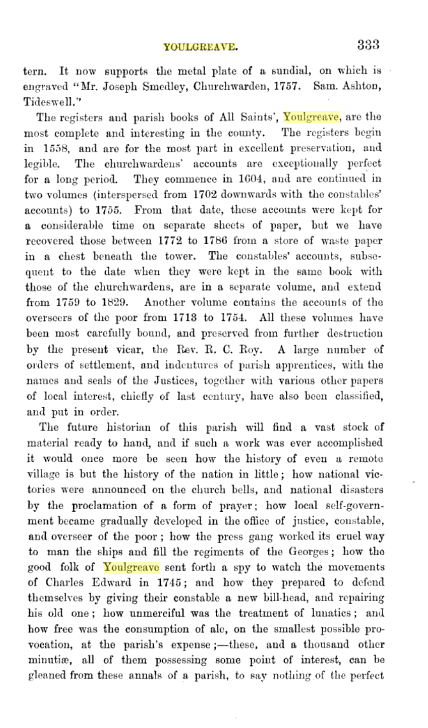
Although the Youlgreave parish registers are available online on microfilm, just the baptisms, marriages and burials are provided on the genealogy websites. However, I found some excerpts from the churchwardens accounts in a couple of old books, The Reliquary 1864, and Notes on Derbyshire Churches 1877.
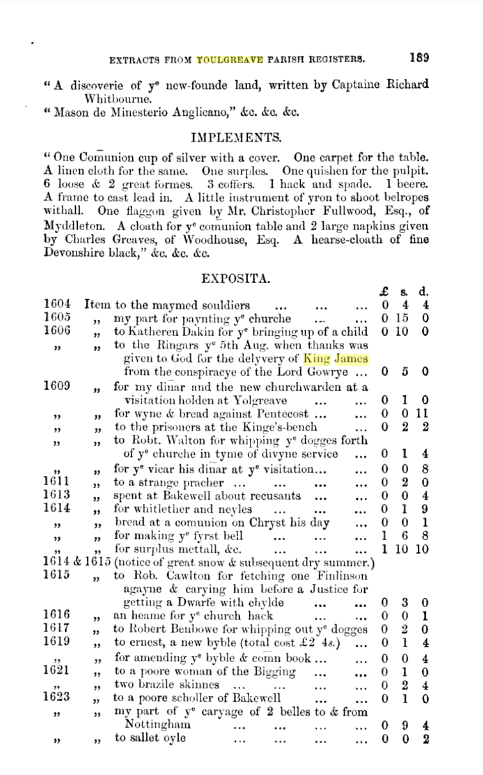
Hannah Keeling, my 4x great grandmother, was born in Youlgreave, Derbyshire, in 1767. In 1791 she married Edward Lees of Hartington, Derbyshire, a village seven and a half miles south west of Youlgreave. Edward and Hannah’s daughter Sarah Lees, born in Hartington in 1808, married Francis Featherstone in 1835. The Featherstone’s were farmers. Their daughter Emma Featherstone married John Marshall from Elton. Elton is just three miles from Youlgreave, and there are a great many Marshall’s in the Youlgreave parish registers, some no doubt distantly related to ours.
Hannah Keeling’s parents were John Keeling 1734-1823, and Ellen Frost 1739-1805, both of Youlgreave.
On the burial entry in the parish registers in Youlgreave in 1823, John Keeling was 88 years old when he died, and was the “late parish clerk”, indicating that my 5x great grandfather played a part in compiling the “best parish registers in the country”. In 1762 John’s father in law John Frost died intestate, and John Keeling, cordwainer, co signed the documents with his mother in law Ann. John Keeling was a shoe maker and a parish clerk.
John Keeling’s father was Thomas Keeling, baptised on the 9th of March 1709 in Youlgreave and his parents were John Keeling and Ann Ashmore. John and Ann were married on the 6th April 1708. Some of the transcriptions have Thomas baptised in March 1708, which would be a month before his parents married. However, this was before the Julian calendar was replaced by the Gregorian calendar, and prior to 1752 the new year started on the 25th of March, therefore the 9th of March 1708 was eleven months after the 6th April 1708.
Thomas Keeling married Dorothy, which we know from the baptism of John Keeling in 1734, but I have not been able to find their marriage recorded. Until I can find my 6x great grandmother Dorothy’s maiden name, I am unable to trace her family further back.
Unfortunately I haven’t found a baptism for Thomas’s father John Keeling, despite that there are Keelings in the Youlgrave registers in the early 1600s, possibly it is one of the few illegible entries in these registers.
The Frosts of Youlgreave
Ellen Frost’s father was John Frost, born in Youlgreave in 1707. John married Ann Staley of Elton in 1733 in Youlgreave.
(Note that this part of the family tree is the Marshall side, but we also have Staley’s in Elton on the Warren side. Our branch of the Elton Staley’s moved to Stapenhill in the mid 1700s. Robert Staley, born 1711 in Elton, died in Stapenhill in 1795. There are many Staley’s in the Youlgreave parish registers, going back to the late 1500s.)
John Frost (my 6x great grandfather), miner, died intestate in 1762 in Youlgreave. Miner in this case no doubt means a lead miner, mining his own land (as John Marshall’s father John was in Elton. On the 1851 census John Marshall senior was mining 9 acres). Ann Frost, as the widow and relict of the said deceased John Frost, claimed the right of administration of his estate. Ann Frost (nee Staley) signed her own name, somewhat unusual for a woman to be able to write in 1762, as well as her son in law John Keeling.
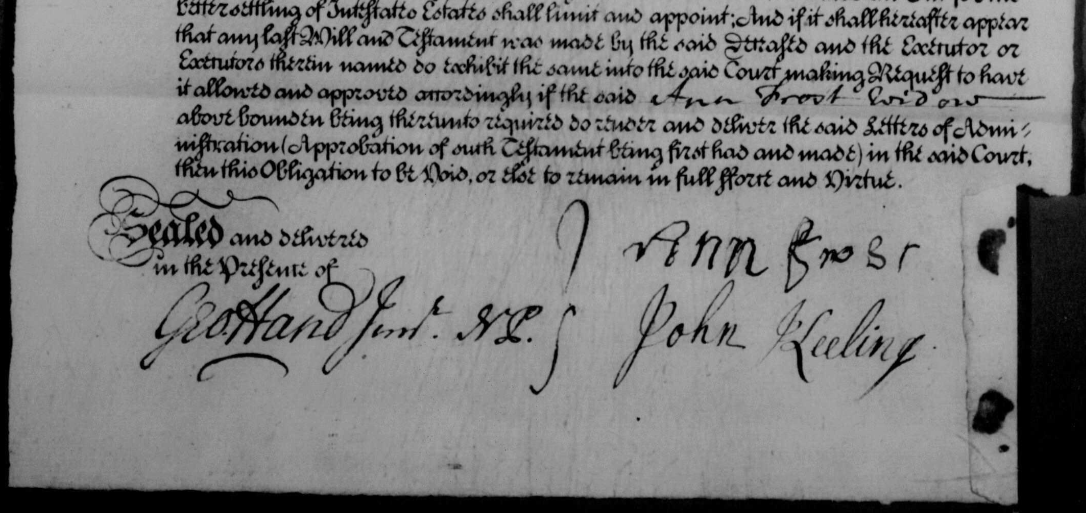
John’s parents were David Frost and Ann. David was baptised in 1665 in Youlgreave. Once again, I have not found a marriage for David and Ann so I am unable to continue further back with her family. Marriages were often held in the parish of the bride, and perhaps those neighbouring parish records from the 1600s haven’t survived.
David’s parents were William Frost and Ellen (or Ellin, or Helen, depending on how the parish clerk chose to spell it). Once again, their marriage hasn’t been found, but was probably in a neighbouring parish.
William Frost’s wife Ellen, my 8x great grandmother, died in Youlgreave in 1713. In her will she left her daughter Catherine £20. Catherine was born in 1665 and was apparently unmarried at the age of 48 in 1713. She named her son Isaac Frost (born in 1662) executor, and left him the remainder of her “goods, chattels and cattle”.
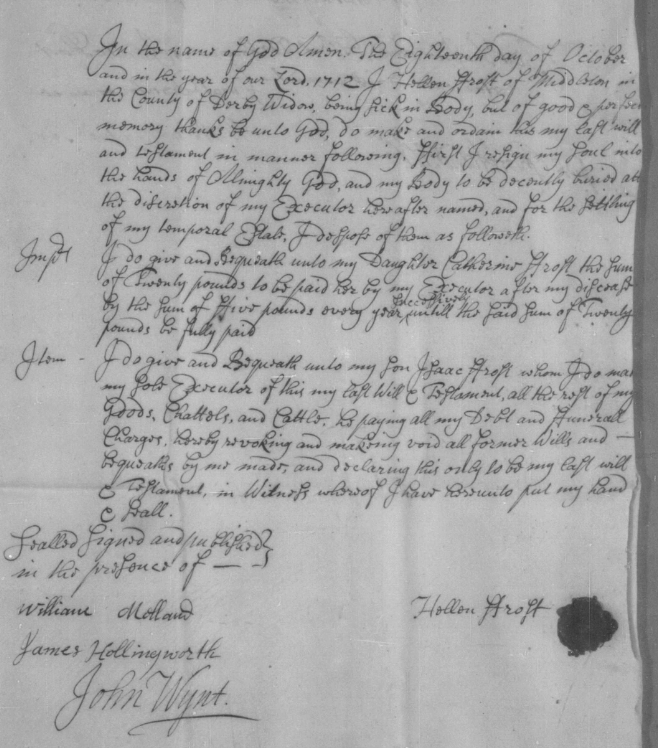
William Frost was baptised in Youlgreave in 1627, his parents were William Frost and Anne.
William Frost senior, husbandman, was probably born circa 1600, and died intestate in 1648 in Middleton, Youlgreave. His widow Anna was named in the document. On the compilation of the inventory of his goods, Thomas Garratt, Will Melland and A Kidiard are named.(Husbandman: The old word for a farmer below the rank of yeoman. A husbandman usually held his land by copyhold or leasehold tenure and may be regarded as the ‘average farmer in his locality’. The words ‘yeoman’ and ‘husbandman’ were gradually replaced in the later 18th and 19th centuries by ‘farmer’.)
Unable to find a baptism for William Frost born circa 1600, I read through all the pages of the Youlgreave parish registers from 1558 to 1610. Despite the good condition of these registers, there are a number of illegible entries. There were three Frost families baptising children during this timeframe and one of these is likely to be Willliam’s.
Baptisms:
1581 Eliz Frost, father Michael.
1582 Francis f Michael. (must have died in infancy)
1582 Margaret f William.
1585 Francis f Michael.
1586 John f Nicholas.
1588 Barbara f Michael.
1590 Francis f Nicholas.
1591 Joane f Michael.
1594 John f Michael.
1598 George f Michael.
1600 Fredericke (female!) f William.Marriages in Youlgreave which could be William’s parents:
1579 Michael Frost Eliz Staley
1587 Edward Frost Katherine Hall
1600 Nicholas Frost Katherine Hardy.
1606 John Frost Eliz Hanson.Michael Frost of Youlgreave is mentioned on the Derbyshire Muster Rolls in 1585.
(Muster records: 1522-1649. The militia muster rolls listed all those liable for military service.)
Frideswide:
A burial is recorded in 1584 for Frideswide Frost (female) father Michael. As the father is named, this indicates that Frideswide was a child.
(Frithuswith, commonly Frideswide c. 650 – 19 October 727), was an English princess and abbess. She is credited as the foundress of a monastery later incorporated into Christ Church, Oxford. She was the daughter of a sub-king of a Merica named Dida of Eynsham whose lands occupied western Oxfordshire and the upper reaches of the River Thames.)
An unusual name, and certainly very different from the usual names of the Frost siblings. As I did not find a baptism for her, I wondered if perhaps she died too soon for a baptism and was given a saints name, in the hope that it would help in the afterlife, given the beliefs of the times. Or perhaps it wasn’t an unusual name at the time in Youlgreave. A Fridesweda Gilbert was buried in Youlgreave in 1604, the spinster daughter of Francis Gilbert. There is a small brass effigy in the church, underneath is written “Frideswide Gilbert to the grave, Hath resigned her earthly part…”
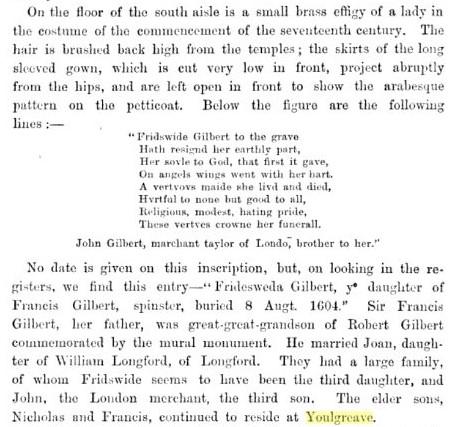
J. Charles Cox, Notes on the Churches of Derbyshire, 1877.
King James
A parish register entry in 1603:
“1603 King James of Skottland was proclaimed kinge of England, France and Ireland at Bakewell upon Monday being the 29th of March 1603.” (March 1603 would be 1604, because of the Julian calendar in use at the time.)
The Big Snow
“This year 1614/5 January 16th began the greatest snow whichever fell uppon the earth within man’s memorye. It covered the earth fyve quarters deep uppon the playne. And for heaps or drifts of snow, they were very deep; so that passengers both horse or foot passed over yates, hedges and walles. ….The spring was so cold and so late that much cattel was in very great danger and some died….”
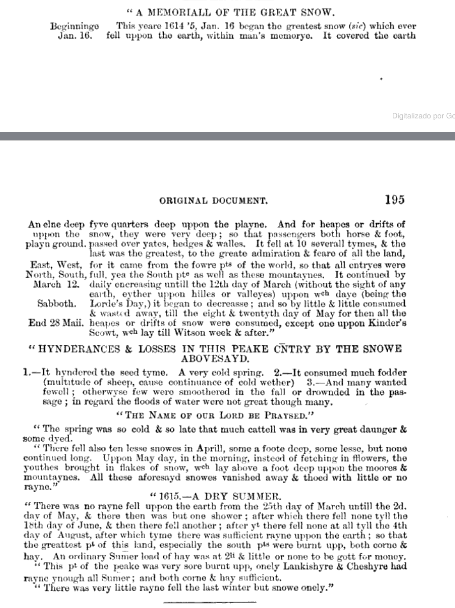
From the Youlgreave parish registers.
Our ancestor William Frost born circa 1600 would have been a teenager during the big snow.
July 22, 2024 at 8:46 pm #7539In reply to: The Incense of the Quadrivium’s Mystiques
There was a quietness before the rush of tourists, and the placid disposition of cows near the field was a nice relief after the madness of the Coven’s endless succession of rituals, workshops, business cases and budgeting of late.
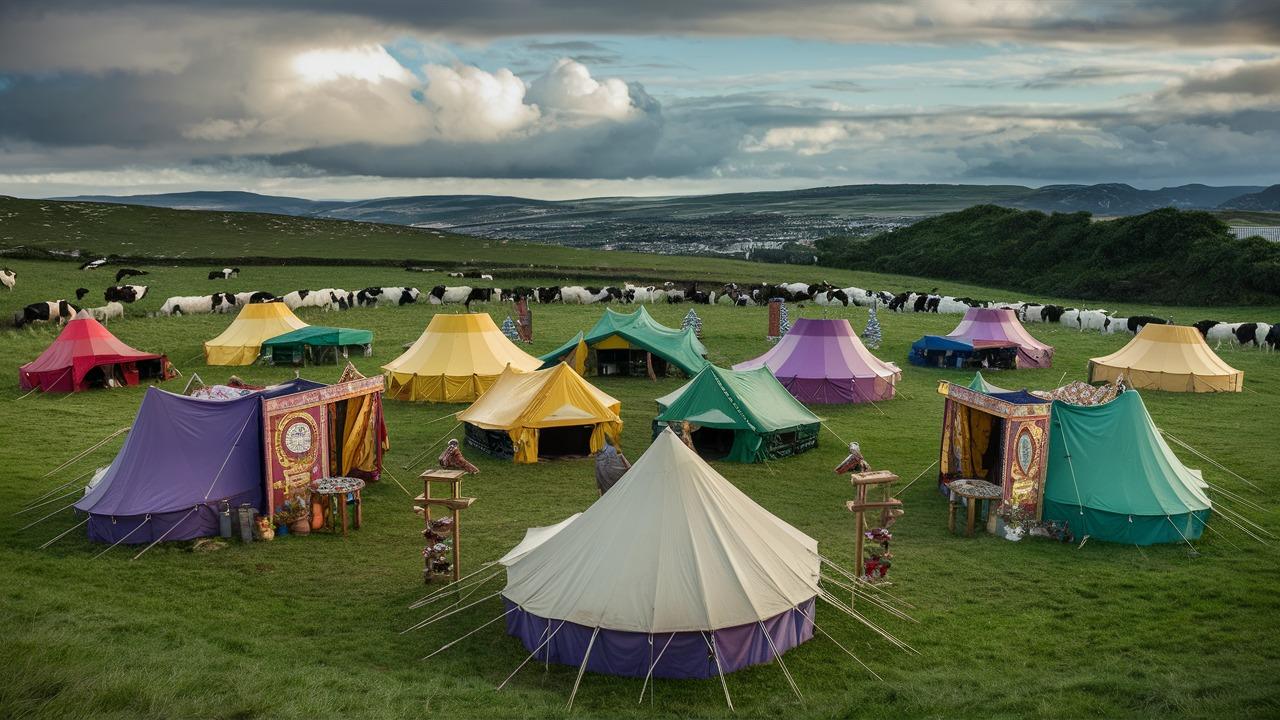
It would be as close a permission slip from Austreberthe for a holiday as any of them were likely to get in a lifetime, so they’d better enjoy it —Eris had reasoned.
Picking the assigned one without putting too much thought to it, Eris had found her yurt pleasantly arranged with an attractive purple color, and even if she was only midly fond of the very hippy and communal setup, with a few insonorisation spells, and interior-designer-enlargement spells, the tent had proven adequate enough.
She’d been here already when Truella and Frella had come through the other tents, chatting vivaciously of course. She’d lifted the muffling spell for long enough to overhear about Malové being here. Well, in case there were any doubt, it seemed it was again all about business. Eris was surprised though that Malové would join, but remembered that Malové was known in her youth to have been a mad racer with a fondness for breakneck speeds. She was probably just here for the Games, like many others.
The longwinded story about the camphor chest had started to recede in the background sound of cud chewing so she didn’t get the fine details of it for now.
Now Eris was wide awake from her nap, and it was as good a time as any to setup her Mellona stall. After all that Coven’s busy activity of the past weeks, there was no small irony (or synchronicity, which would be the same, with a better state of mind) that she’d found herself in charge of the Roman Goddess’ stall. Maybe she would find interesting ways to channel the hive’s power to support their queen.
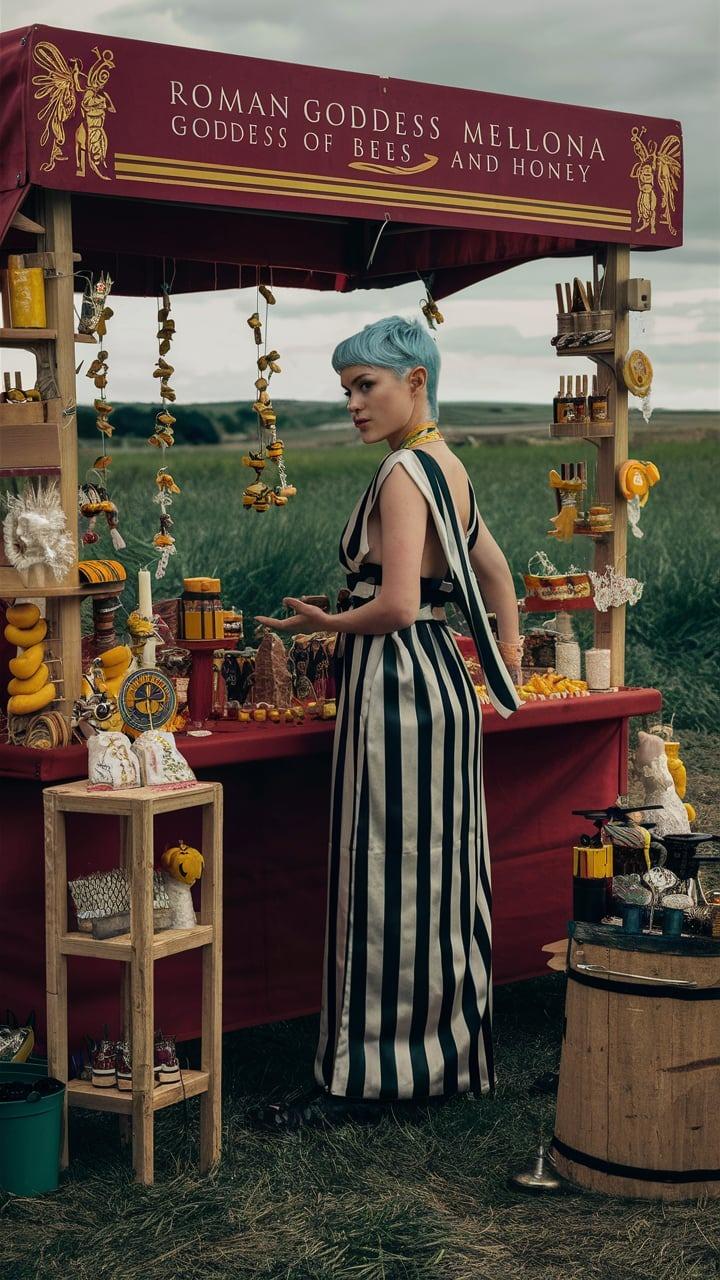 July 19, 2024 at 12:26 pm #7536
July 19, 2024 at 12:26 pm #7536In reply to: The Incense of the Quadrivium’s Mystiques
The rainbow was neon bright, one end disappearing behind a spinney in the distance, and the other end landing squarely in the middle of the glamping pods. A good sign! thought Truella, the first of the coven to arrive. For a moment she imagined herself digging a hole right there, and finding the elusive pot of gold. I wouldn’t be able to do that in a fancy hotel. For once, Truella was happy with Austreberthe’s choice. A week or two in a green field sounded relaxing, refreshing. So much more to her taste than the endless fitted carpets, closed windows, and artifically controlled air blasting out of metal grilles in hotels.
Taking a deep breath of cool fresh air, she surveyed the site before checking into reception. The neighbouring fields were full of cows, perfect for her to practice her Bubona spells on before she set up her Goddess Spell Booth. The Goddess spell tents were to be open in the evenings, after the games each day, along with other stalls selling handicrafts, homemade cakes and jams, wines and potions, trinkets and souvenirs, and all the other tat that people on holiday enjoyed browsing. Obviously the coven would have a stall selling incense. No doubt Austreberthe would have hatched some hard sell plan for that.
Inside the reception office, Truella pinged the bell and waited for someone to attend. The registration book was open on the counter and Truella craned her neck to read the names on the list. She planned to ask for a pod in a far corner, near the hedgerow. It might make it easier to slip out unnoticed, if she should have a mind to do so. The door behind the counter opened and a young man appeared, smiling a welcome. But not before Truella had seen the name on the list. She sucked her breath in sharply. Malove! Nobody was expecting her. Did Austreberthe know?
“Welcome to Finnegan’s Farm Glampsite, I’m Liam,” said the young man, pushing long mousy hair out of his eyes, “You’ve a booking I take it, because we’re fully booked up for the next fortnight. Because of the Games, you see.”
Replying that she did, Truella asked for a pod in the furthest corner. Liam looked at a list and frowned. “The corners are all taken, I’m afraid. But I tell you what,” he said, “As you’re the first to arrive I’ll swap your pod, let’s see…” He scanned the list. “Ah yes, the late booking. I can put you in the one we’ve assigned to Mrs …Malone I think it says, and put her in yours.”
“Thank you very much, Liam,” Truella said as he handed her a key with a big wooden tag with the number 33 etched on it.
“I’ll carry your bags over and show you where it is, follow me.”
June 29, 2024 at 10:01 pm #7527In reply to: The Incense of the Quadrivium’s Mystiques
It was good to get a break from the merger craziness. Eris was thankful for the small mercy of a quiet week-end back at the cottage, free of the second guessing of the suspicious if not philandering undertakers, and even more of the tedious homework to cement the improbable union of the covens.
The nun-witches had been an interesting lot to interact with, but Eris’d had it up to her eyeballs of the tense and meticulous ceremonies. They had been brewing potions for hours on, trying to get a suitable mixture between the herbs the nuns where fond of, and the general ingredients of their own Quadrivium coven’s incenses. Luckily they had been saved by the godlike apparition of another of Frella’s multi-tasking possessions, this time of a willing Sandra, and she’s had harmonized in no time the most perfect blend, in a stroke of brilliance and sheer inspiration, not unlike the magical talent she’d displayed when she invented the luminous world-famous wonder that is ‘Liz n°5’.
As she breathed in the sweet air, Eris could finally enjoy the full swing of summer in the cottage, while Thorsten was happily busy experimenting with an assortment of cybernetic appendages to cut, mulch, segment and compost the overgrown brambles and nettles in the woodland at the back of the property.
Interestingly, she’d received a letter in the mail — quaintly posted from Spain in a nondescript envelop —so anachronistic it was too tempting to resist looking.
Without distrust, but still with a swish of a magical counterspell in case the envelop had traces of unwanted magic, she opened it, only to find it burst with an annoying puff of blue glitter that decided to stick in every corner of the coffee table and other places.
Eris almost cursed at the amount of micro-plastics, but her attention was immediately caught by the Latin sentence mysteriously written in a psychopath ransom note manner: “QUAERO THESAURUM INCONTINUUM”
“Whisp! Elias? A little help here, my Latin must be wrong. What accumulation of incontinence? What sort of spell is that?!”
Echo appeared first, looking every bit like the reflection of Malové. “Quaero Thesaurum Incontinuum,” you say. How quaint, how cryptic, how annoyingly enigmatic. Eris, it seems the universe has a sense of humor—sending you this little riddle while you’re neck-deep in organizational chaos.
“Oh, Echo, stop that! I won’t spend my well-earned week-end on some riddle-riddled chase…”
“You’re no fun Eris” the sprite said, reverting into a more simple form. “It translates roughly to “I seek the endless treasure.” Do you want me to help you dissect this more?”
“Why not…” Eris answered pursing up her lips.
““Seek the endless treasure.” We’re talking obviously something deeper, more profound than simple gold; maybe knowledge —something truly inexhaustible. Given your current state of affairs, with the merger and the restructuring, this message could be a nudge—an invitation to look beyond the immediate chaos and find the opportunity within.”
“Sure,” Eris said, already tired with the explanations. She was not going to spend more time to determine the who, the why, and the what. Who’d sent this? Didn’t really matter if it was an ally, a rival, or even a neutral party with vested interests? She wasn’t interested in seeking an answer to “why now?”. Endless rabbit holes, more like it.
The only conundrum she was left with was to decide whether to keep the pesky glittering offering, or just vacuum the hell of it, and decide if it could stand the test of ‘will it blend?’. She wrapped it in a sheet of clear plastic, deciding it may reveal more clues in the right time.
With that done, Eris’ mind started to wander, letting the enigmatic message linger a while longer… as reminder that while we navigate the mundane, our eyes must always be on the transcendent. To seek the endless treasure…
The thought came to her as an evidence “Death? The end of suffering…” To whom could this be an endless treasure? Eris sometimes wondered how her brain picked up such things, but she rarely doubted it. She might have caught some vibes during the various meetings. Truella mentioning Silas talking about ‘retiring nuns’, or Nemo hinting at Penelope that ‘death was all about…”
The postcard was probably a warning, and they had to stay on their guards.
But now was not the time for more drama, the icecream was waiting for her on the patio, nicely prepared by Thorsten who after a hard day of bramble mulching was all smiling despite looking like he had went through a herd of cats’ fight.
June 25, 2024 at 7:39 pm #7522In reply to: The Incense of the Quadrivium’s Mystiques
As soon as Eris had left the room, Truella thought for a moment she was hallucinating, as Eris popped back right in through the entrance.
“So, what did I miss?” Eris asked, looking exactly the same if a little worn out.
“What do you mean what did you miss? You hardly missed anything, since you’ve just never left!” Truella protested, as the absence of sleep wasn’t cause enough to make her doubt her senses.
“Ah… I see… Those time-travel shenanigans. Hard to wrap one’s head around sometimes.” Eris said matter-of-factly. “No matter, glad to be back, well… so soon… by your standards. Let’s get back to business then? When’s the next ritual? Don’t we have to brew a potion or something?”
“No, no, no… Not so fast! What happened to your trip? you have to tell us all, and TIME TRAVEL! Where, when, how, with whom? We want to know all, n’est-ce-pas ma petite Jeezel?”
“Tsk, tsk. For another time. Suffice to say, I was gone for longer than I wanted, and clearly that nun-witch portal had been tempered with, sent me right in the middle of the darn Middle-Ages. But I can’t tell you more here…” Eris said with an air of mystery. “Stone walls are thick, but not as deaf as Mother Lorena, that’s for sure.”
June 21, 2024 at 8:17 am #7512In reply to: The Incense of the Quadrivium’s Mystiques
“If you ask me,” said Trella, although nobody had, “If anyone wants the merger to fail, it’ll be someone from the Cloisters.”
“Seems like none of us want it, why single them out?” asked Frella. “Well,” she added, glancing at Eris, “Not all of us maybe but for most of us it’s just a hassle. Just more work, and no real benefits for the likes of us, anyway.”
“Think about it, Frell. Sure, it’s just a nuisance for the witches and the nuns, but not enough of a bother to play with fire meddling with far grander schemes. That’d be way out of the depth of most of us, I’m sure. But there’s more going on at the Cloisters than meets the eye. There are other, er, things here, things that don’t want change.”
“Like what?” asked Eris in a doubtful tone.
“I don’t know but I can feel it. Can’t you? Eris, you’re so busy looking at spread sheets and finances you are losing your second sight! The undercurrents are bubbling up so much we’ll drown before long! We’re all looking at each other with suspicion, and meanwhile….”
“You mean we can trust the Morticians?” asked Jeezel hopefully. Eris glared at her.
“Maybe,” Trella said. “Maybe. We don’t know anything for sure yet. But I suggest we stop looking at the nuns, I mean the ordinary rank and file nuns, and the morticians with suspicion and focus on the place itself. There’s a long dark history to this place. And if you ask me, Brother Bartolo knows something.”
“Surely he’s not behind the whole thing!”
“Not behind the whole thing, no, but he knows something. And the gardener, Brother Babbit. Sassafras told me there’s nothing Brother Babbit doesn’t know about the history of this place, but that he only wants to talk about the plants, you know, the local wildlife and such. And,” Truella paused dramatically, “Sandra dropped something out while we were smoking weed in the orchard after the reception. She said Brother Bartolo said he’d seen the Sisters of the Sacred Sepulchre roaming around in the cellar, waiting for orders!”
“The sisters of the friggen what?” Jeezel sighed. Not more characters to convolute everything even more! “Roaming around in the cellars? Oh come on!”
“And that’s not all,” Truella lowered her voice to a whisper. “Sassafras said something about them being reanimated.”
Finally, Eris started taking Truella seriously. “Reanimation? I don’t like the sound of that. We’d better find out as much as we can about the sisters of the cellars, who are they, I mean who were they, have they been reanimated before, and what were the circumstances.”
“Right ho, I’ll just boogle it, shall I?” Jeezel said sarcastically.
Eris rolled her eyes. “No need for the snark. The clues will be here, right here at the Cloisters. We need to check the library, look in every room for clues, check out all the tapestries and paintings, speak to Brother Bartolo and Brother Babbit, but without making them suspicious, mind! Just pretend an interest in history, no mention of the merger! Keep it light! And keep it light with the morticians, but keep it superficial, until we know more. And then…,” Eris looked at each of them. “we need to go down to the cellars. I suggest we do that together.”
“We need Frella to come for that,” Truella stated the obvious. The others murmured their agreement.
June 21, 2024 at 7:22 am #7511In reply to: The Incense of the Quadrivium’s Mystiques
“What? Malové sent you a personal letter? And a golden key! We merely had a memo for the merger,” Truella said, pacing quickly in Jeezel’s bedroom.
“You’ve been swooning over Mr. Dark since we got here,” said Jeezel. “Have you even checked your own things? Maybe you have some kind of message or clue or I don’t know what. But stop pacing like that, you’ll bore a hole in my floor.”
“That’s not your floor,” said Truella with fire in her eyes.
“Girls, stop. That’s not the point,” said Eris, her voice carrying icy breeze of Sweden’s coldest winters. “We don’t even know if that message is from Malové.”
“What do you mean?” asked Jeezel and Truella in unison.
“Yes, what do you mean?” asked a floating glowing orb with Frella’s voice.
Eris brushed a few sparkling dark purple powder from her chest. “Bloody dragon soot,” she muttered. “Well, from what you told us, Silas tried to jinx you when you were discussing about the rituals. Baiting you with the idea that there are amongst or around us forces that would rather see this merger fail. Then, conveniently, handsome Garrett comes to your rescue and warns you about Silas’ evil plot, and talks to you about the very thing Malové supposedly entrusted you with in that letter, and muddying the waters even further with that tale about ancient Punic families.”
“What’s wrong with Punic families,” said Truella.
“Why are you blushing?” asked Jeezel.
“The point is, that it could very well be part of a plot to plant doubts about everyone and everything, so that we make the merger fail ourselves.”
“And then exit the witches from the picture,” said Frella’s glowing voice.
“But who could possibly have hidden the envelope amongst my things without me noticing?” asked Jeezel.
“Who comes and goes into your home?” asked Eris.
“Yes, who?” asked Truella with a sudden renewed interest.
After a few moments of reflection, Jeezel raised her hand to her mouth. “You can’t mean Joe? My fan’s brother who came to do some works for me.”
“I don’t mean anything. But if I recall well, you mentioned you gave him the keys or your home so that he could come do the repairs whenever you’re not there.”
“You gave him your keys?” asked Truella, her eyes wide open.
“But Luminia would have seen him.”
“Well even a familiar needs to go out sometimes.”
“Or maybe after a torrid night, when you’re finally resting,” suggested Truella.
“Ooh! You would love that!” Jeezel said. Then she put the back of her hand on her forehead and moaned: “My brain’s not made for that kind of messy story. I can’t investigate, do the rituals, flirt with the enemy. There are too many things to do and too many possibilities.”
“There, dear. You have us now,” said Eris, still brushing the dragon soot from her dress.
“And I know one who needs to go to the bottom of a chest,” added Truella. “Frella, we need you here.”
“I’m not sure,” Frella said. “I guess someone has to investigate what really happened to Malové. Who knows if that postcard and that love affair are even real? I’ll let you know.”
June 17, 2024 at 7:40 am #7487In reply to: The Incense of the Quadrivium’s Mystiques
Although not unheard of in Limerick, it had been raining for days and that affected moods. The weather forecast, despite many promises, hadn’t been able to curb the collective melancholy. Jeezel had to resist the temptation to use a spell or two just for an hour of sunshine, but she remembered what Linda Paul would say about meddling with weather patterns. She’d likely take a dramatic pause, her eyes narrowing in theatrical emphasis as she weighed her words carefully.
“Darling, one does not simply tinker with the weather as if it were a mere accessory to one’s outfit. The weather, you see, is a complex symphony conducted by the universe itself. Each raindrop, each gust of wind, each sunbeam—it’s all part of an intricate, celestial score. Tampering with such forces is akin to striking a discordant note in a masterpiece; the repercussions can be chaotic and unpredictable. Mother Nature has a way of setting things right, and trust me, her methods are rarely gentle. Remember the tale of the tempestuous sorcerer who tried to stop a storm and ended up summoning a hurricane? Or that ill-fated witch who thought to banish winter, only to plunge her village into eternal ice?” Her eyes might sparkle with a hint of mischief as she added, “And let’s not forget the fashion disasters! Imagine trying to maintain a perfect coiffure in a sudden downpour you inadvertently summoned. Utterly tragic, darling.”
Jeezel giggled at the evocation. No, she would not meddle with the intricate weave of weathery, but one little filter spell on her window was innocuous enough to transform the “gloom of June” into a “dawn’s gentle fingers caressing the horizon”. She was standing before her ornate, vintage mirror in a midnight blue gown. The magic morning light was dancing upon the silver filigree, casting ethereal patterns across her boudoir.
Her thoughts meandered through the labyrinth of anticipation and preparation. “A convent,” she mused, “How delightfully austere. A stark contrast to my usual flamboyance.” In her address to the coven and looking specifically at Jeezel with ice cold eyes, Austreberthe had insisted on modesty and temperance. “But then, Austreberthe is not Malové,” Jeezel said, “and even the most demure places need a touch of magic.”
She ran her fingers through her raven locks, contemplating her wardrobe. “Burgundy for modesty and vintage silver lace mantilla for a whisper of enchantment”, she decided. It would strike the perfect balance.
Then, her mind turned to practicalities. The convent, with its storied history and sacred relics, would likely be a trove of ancient magics. She carefully selected a few essential items on her vanity: a vial of protective potion, a small pouch of moon blessed herbs and her favourite amulet in the shape of a silver hedgehog she got from her grand-mother and imbued with protective and clarity spells.
Her eyes fall on the thick file Truella had given each of them the day before. Full of charts and bullet lists about the cloister, questions about history, mug shots and detailed descriptions of the current inhabitants, with (not so) occasional pictures of her own digs and dogs. If Eris had skimmed through it in seconds and started to ask questions, Frella said she would read it before going to bed as it helped with her remembering. Jeezel had said nothing. She had gotten dizzy with too many bullet points and letters. All she could think about was the precious space and weight it would take in her suitcase and in her mind.
Though, there was something different. An envelop stuck between the file and the mahogany wood of the vanity. She took the envelop and opened it. It contained a letter and a small, ornate key, its surface inscribed with runes that glimmered with an otherworldly light. The paper grain was of fine quality. Jeezel recognized Malové’s intricate calligraphy. The paper carried subtle fragrances of sandalwood, jasmine, and bergamot, with a touch of vetiver and ambergris. With each whiff hidden facets were emerging from an apparently simple message.
“Jeezel, my trusted enchantress,” it started, “your journey to the convent in Spain is of utmost importance, more than the others can fathom. Beneath the cloistered serenity of those ancient walls lies a secret long kept from the world—a relic of unparalleled power known as the ‘Crimson Opus.’ It is said to be a manuscript not written with ink, but with the very essence of time itself.”
Your mission is to locate this Crimson Opus. It is guarded by a labyrinth of spells and enchantments designed to deter even the most skilled of seekers. But you, my dear Jeezel, possess the unique aptitude to unravel its mysteries. The convent’s seemingly mundane routines are the veil that conceals its true purpose; a sanctuary for the relic, and a prison for those who seek its power with ill intent.”
“You must be cautious, for the Crimson Opus has a sentience of its own. It will test your resolve, tempt you with visions and promises. Trust in your instincts, and remember, its true power can only be harnessed by those with a pure heart and an unyielding will.”
“The key will guide you to the hidden chamber where the Opus rests. Use it wisely, and under no circumstances let it fall into the wrong hands. You are more than capable, my dear. Don’t mention your mission to anyone. The fate of many may hinge upon your success, but I have no doubt in your abilities. Go forth, and may the ancient forces watch over you.”
Jeezel would have thought of a joke were it not for the mastery with which the message and its hidden layers had been crafted. She thought Malové was enthralled in a passionate romance in Brasil, but something in the scent she had not been able to decipher seemed to suggest the reality was more complex than it seemed. She thought of her friends. Did they all received a similar letter? Whom could she trust when secrecy was mandatory?
She held her hedgehog amulet more tightly, asking for some guidance.
-
-
AuthorSearch Results
